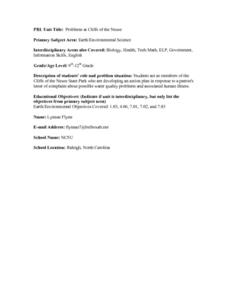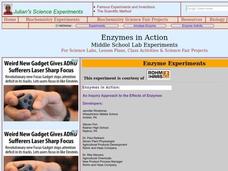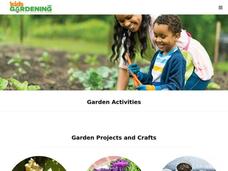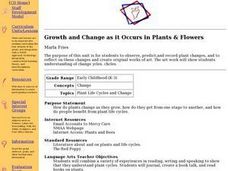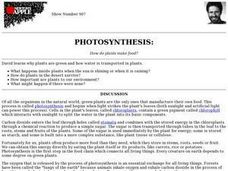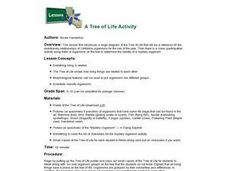Curated OER
Problems at Cliffs of the Neuse
Students assume the roles of members of the Cliffs of the Neuse Sate Park and must develop an action plan in response to a complaint about possible water quality problems and associated human illnesses. Students conduct research on the...
Curated OER
More Than One Grain of Rice
Students explore mathematics, geography and agriculture by studying world rice production. In this production of rice lesson plan, students read One Grain of Rice and use a worksheet grid to calculate how much rice was received. Students...
Curated OER
Enzymes in Action
Students explore how enzymes are important in the chemical reactions of all living things. In this enzymes and catalysts lesson students complete an activity to see how enzymes change living things.
Curated OER
Can Photosynthesis Occur at Saturn?
Students identify the different requirements for photosynthesis to take place. In this space science lesson plan, students simulate conditions in Saturn to investigate if photosynthesis is possible there. They use data and observations...
Curated OER
Making Paper
Students read about the history of paper production and make their own recycled paper. In this paper making lesson, students follow the directions to make paper from recycled paper. Students also learn about making paper from live plants.
Curated OER
The Effects of Solar Energy
Young scholars examine how solar energy is absorbed and used. For this solar energy lesson students complete several activities that allow them to better understand solar energy.
Curated OER
Dried Vs. Soaked Beans
Students observe the differences between a dry and soaked bean, and identify the functions and parts of a bean at the beginning of its growth.
Curated OER
What's In A Name?
Students analyze themselves as members of the community. They choose a name to describe themselves and explain why they choose the name they did. They identify activities they perform in and out of school to help the community.
Curated OER
Dichotomous Key for Identifying Pine Trees
Students identify the species of pine trees that are found in their area. They use unlabeled "mystery" samples and a dichotomous key to identify the pine trees to species. After identification, they use a field guide to answer worksheet...
Curated OER
Plants from Trash
Students observe how plants recycle themselves, and discuss different types of propagation.
Curated OER
Getting a Handle on Your Bee
Students observe dried bees, carefully glue them to toothpicks, and use them for cross pollinating their Brassica plants. They also describe reasons why two similar investigations can produce different results. Finally, students...
Curated OER
We're All The Same on the Inside
Students discuss prejudice around the Martin Luther King, Jr. holiday. They use brown and white eggs to discover that they are both the same on the inside even though they look different on the outside.
Curated OER
Flipbook Succession
Young scholars review succession charts for their native area before going to an outside site to view the changes. At the site, they follow the transect line and observe the changes in the plant life. They draw the changes on note cards...
Curated OER
Growth and Change as it Occurs in Plants and Flowers
Students work together to observe plants and flowers through their life cycle. In groups, they make predictions and record changes in a journal. Using this information, they create their own original artwork and discuss the plants life...
Curated OER
Baby Peanut Plants
Science is a subject ripe with opportunities to read informational text. Kids read to learn about peanuts! They read an informational passage, fill out two comprehension worksheets, and then conduct a lab experiment on a peanut. The...
Curated OER
Let's Sort a Salad
Students examine edible plants by identifying salad ingredients. In this botany lesson, students discuss the different vegetables that can be eaten in a salad and draw them on a worksheet. Students review vegetable vocabulary and examine...
Curated OER
Photosynthesis: How do plants make food?
Learners study why plants are green and how water is transported in them. They examine how plants respond to different amounts of light.
Curated OER
Investigation Xylem
Students investigate how water travels up the stem of vascular plants by using food coloring to stain the xylem of a number of different plants. They know the function of leaves, stems, and root at the end of the experiment.
Curated OER
LET YOUR FINGERS DO THE WALKING
The student will recognize different information sources. 2. The student will use a telephone book as a resource for locating agricultural businesses
and people with agriculture-related jobs.Discuss the purpose of the phone book, and...
Curated OER
HAPPY SOIL, SAD SOIL
Students will be able to identify the characteristics of healthy soil and unhealthy soil.Take the class outside to an area of thick grass near trees, if available. Compare the
clothes people wear to the thin cover. Discuss the reasons...
Curated OER
Home Sweet Home
Students examine the animals that live in trees. They identify their sounds, footprints and droppings. They draw pictures of the animals as well.
Curated OER
A Tree of Life Activity
Students solve a mystery of the identification of a unknown organism by comparing its morphological characteristics to those in a tree of life classification poster. They compare the observable characteristics of the specimen and...
Curated OER
Animals
First graders study the basic needs of animals and compare them to human needs. They make bird feeders using milk carton and pine cones. They review the basic needs of food, water, air, and shelter and discuss what happens when animals...
Curated OER
Forests and Photosynthesis
Fourth graders explore the concept of photosynthesis. They investigate the effects of light on seedlings. Students grow plants and record the data. Students view satellite images that show the monthly amount of vegetation present in the...
Other popular searches
- Plant Seeds Scattered
- Growing Plant Seeds
- Science Plant Seeds
- Fractions With Plant Seeds
- Fractions Using Plant Seeds


